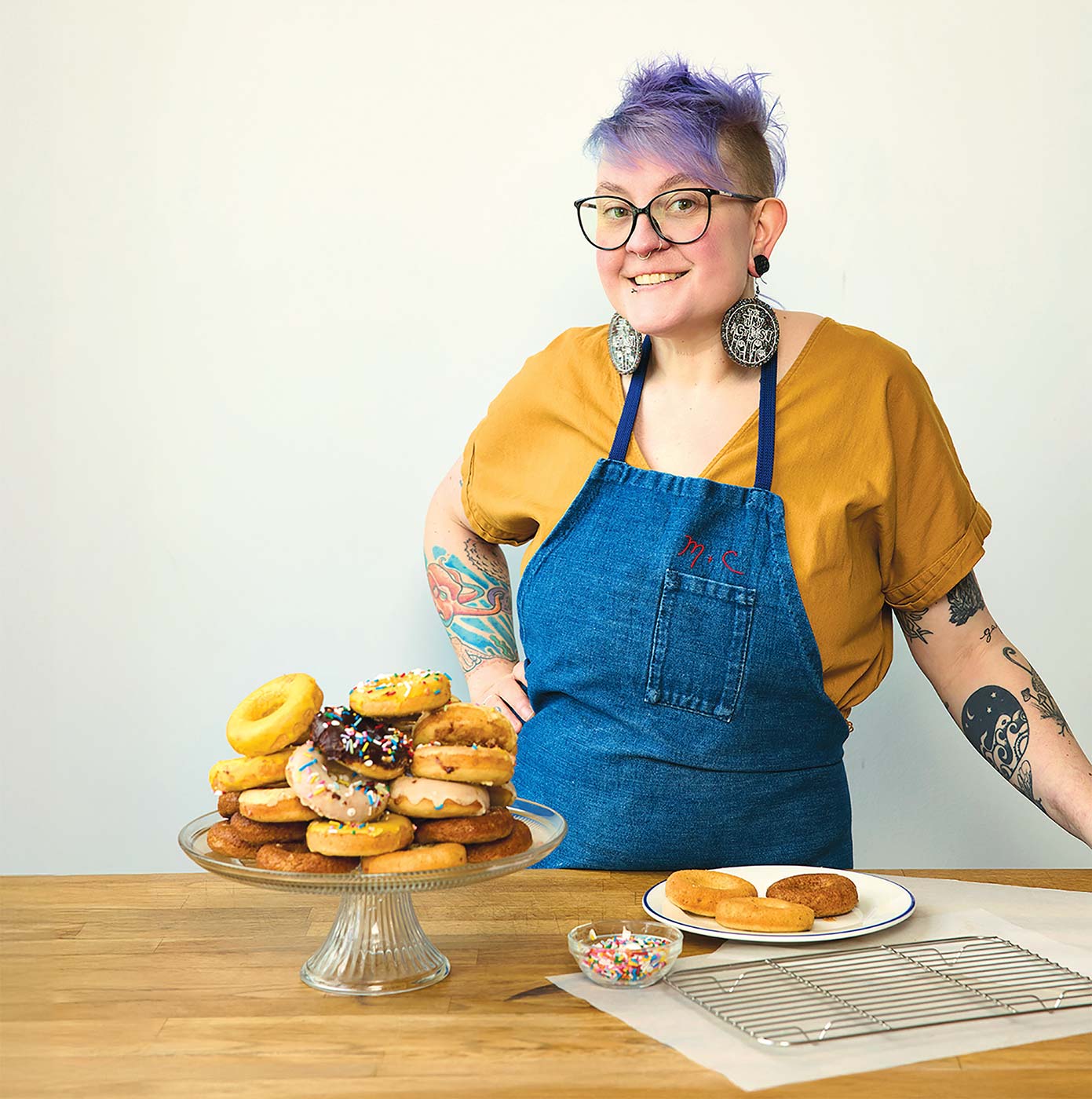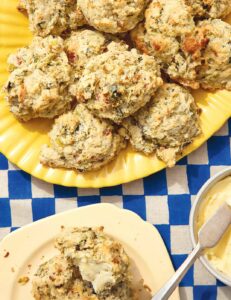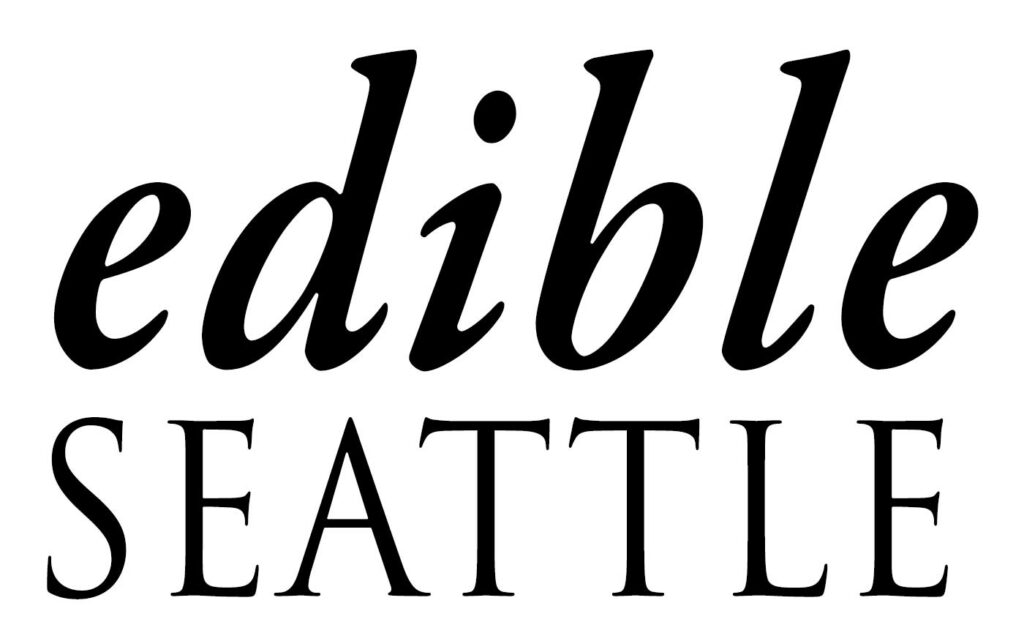
IMAGES COURTESY OF RASPBERRY BOW PRESS
The Revolution Will Be Well Fed is a celebration of activism, and fueling the work
There’s a large bookshelf in my house dedicated solely to cookbooks. I have at least 100, from large, heavy tomes to small zines with boldly patterned covers. Each one serves a different purpose—some I refer to like a dictionary, some are filled with notes and clippings, some I’ve read cover-to-cover, like a novel. There are post-it notes in almost every one, and many have been warped by splattering sauces and dotted with hot oil, the pages sticking together.
When I received a copy of Corrie Locke-Hardy’s cookbook, The Revolution Will Be Well Fed, I knew which camp the book would fall into—I read the book all in one go, over several cups of coffee.
Locke-Hardy is the person behind The Tiny Activist, an organization that helps educators build Anti-Bias, Anti-Racist (ABAR) curricula. In addition to being an educator herself, Locke-Hardy is a former pastry chef, and has created a cookbook that brings her skill sets together.
When you first flip through the book, it’s easy to be intimidated by the solid chapters of text—albeit with fun block fonts and colorful images—something that Locke-Hardy addresses immediately, by declaring she hasn’t written a textbook with a few recipes sprinkled in. And she hasn’t—the book is chock-a-block full of information about historical and current social justice movements, reinforcing how central food is in activism, but delivered in such an open and welcoming way, like a friend is leading you through to the party. It’s neither dry nor preachy, but informative, upbeat and a little cheeky.
The book is broken into three sections: breakfast, snacks and desserts. Locke-Hardy has very thoughtfully developed recipes that start out automatically gluten-free. She didn’t write a gluten-free cookbook—the recipes also work perfectly well with standard all-purpose flour—but the recipes are designed to be equally accessible, true to the spirit of the author. “There is no scarcity in the community I fight for,” she writes.
The Revolution Will Be Well Fed
By Corrie Locke-Hardy
Raspberry Bow Press, 2024

The book starts with breakfast, and gives us an aerial view of the Black Panther Party’s innovative breakfast program, which was feeding upwards of 10,000 schoolchildren around the country at its height, touching on the work of its membership, especially the black women of the BPP whose work often goes unsung. As the book goes on, there are profiles of important figures, there are numerous micro-essays about subjects like government surveillance, queer joy and the ballroom scene, pages on how to be a good ancestor—then recipes for biscotti, for biscuits, for donuts.
The jump should cause serious cognitive dissonance, but it doesn’t. Locke-Hardy reinforces the importance of food in creating a more just world for everyone—insisting that building joy and community care through food is central for sustaining political movements like strikes (there’s a sidebar on that too), boycotts, abolitionism—the list goes on. Locke-Hardy makes it clear that many hands make light work for justice, and the work is easier when you have a savory hand pie warming your belly, and the bellies of your friends.
There is no judgement or shame anywhere in Locke-Hardy’s words—she encourages everyone to start where they are. To her, a donut is a springboard, a place to start. She writes, “This isn’t just true of food—when it comes to history and social justice, we meet where identities intersect, where disparate ingredients come together to create innovative and imaginative flavors, made better by their differences. Start small, and keep growing—we’ll begin with food, and then we’ll move beyond, together.”
Food is extremely political, but Locke-Hardy sets a banquet of goodies for us all to savor and share, and makes it easy to find a seat at the table. Each recipe is simple to double or triple, there are constant ways to make things your own, and ways to start a conversation about some of these movements with the folks in your circle. My favorite part, besides her tongue-in-cheek names like “The Right to Choose Cheese Crackers” and “No More Monopolies Macchiato Fluff Brownies” (which are delicious, I can confirm), is that she has chosen to end the book with a call to action and a reading list, which I think every author should include. Her list includes books to expand your knowledge of these movements, and to shift your mindset, exploring the inherent bias in each of us. There’s no such thing as a perfect person, or a perfect movement or a perfect humanity, but Locke-Hardy has laid a foundation to do the work, one bite at a time.

